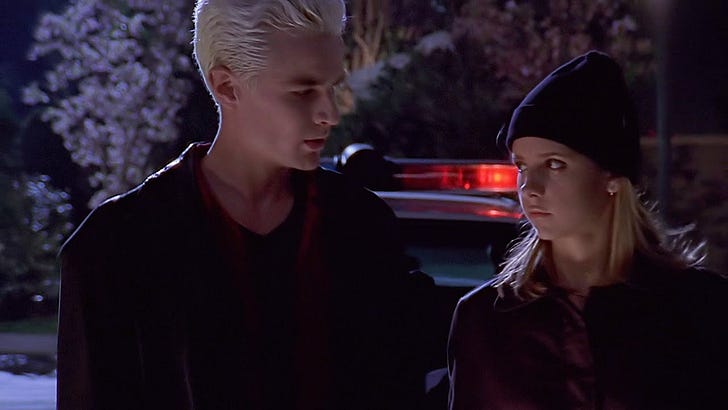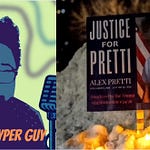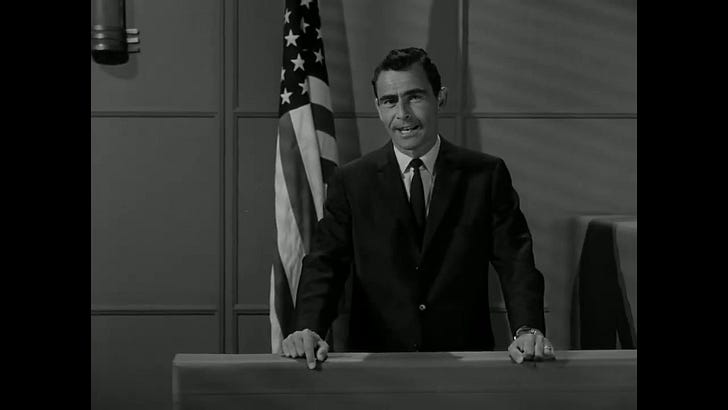Twilight Zone creator Rod Serling was born on Christmas Day, 1924. I had the great honor of speaking with Emmy-winning writer Joseph Dougherty (Thirtysomething, Pretty Little Liars) about his new book, Rod Serling at 100: One Writer's Acknowledgment, a wonderful tribute to Serling that examines his work and significant contributions to television.
Serling also wrote one of my favorite Christmas stories, “The Night of the Meek,” starring Art Carney, which I try to watch each year.
Transcribed excerpts from our conversation:
SER: I’m a tremendous fan of Rod Serling in particular. He’s sort of a personal inspiration. Since I was a kid, I’ve read everything written about him and his work and [The Twilight Zone.] What I think I appreciate most about your book is that — you are obviously an acclaimed writer yourself — and I’ve always chafed at the idea that Twilight Zone is some sort of guilty pleasure or that Serling was a pulp writer.
I think he’s one of the greats, and you give him his flowers, to use that term, as someone in the field to look at his work as a writer and his impact on the work.
So, can you just tell us what inspired you to write about Serling?
JOE: Well, I’ll tell you right now, your reaction to the book is incredibly satisfying because it’s exactly what I wanted to do. I realized about a year ago that we were coming up on his centenary. And I thought if I was ever going to sit down and really talk about him and talk about what he’s meant to me and the kind of writer he is, this would be the moment to do it. And it’s kind of worked out rather well.
I either had very neglectful or very indulgent parents, but I am of an age where I was able to be exposed to The Twilight Zone as a kid in its original broadcast. And when you’re a kid, you’re kind of a sponge for everything around you, but you’re pretty quick at determining what the good stuff is and what the bad stuff is. And Serling, his storytelling, his approach to storytelling, and his physical presence as a writer who had a job and his job was storytelling, standing there at the beginning of The Twilight Zone episodes after the first season — the first season he just narrated — standing there being a writer and saying, these are written stories, these are handcrafted objects, and we want you to pay attention.
And from that, pretty much from that moment on, even though I recognize it a little bit more in retrospect, like is usually the case, that’s how I started to become a writer. His influence never left me.
He was only 50 years old when he died in 1975. I think it was a tremendous loss to television and to education. He said himself that working in television was not for anyone under 40 years old. I fortunately have been able to disprove that slightly. But he was becoming an amazing teacher at Ithaca and at some other places where he visited.
I encountered him when I was in college and pretty much made an idiot of myself in the process. So maybe this book is an apology. I’m not so sure. I just wanted to put him in a kind of perspective for myself and also a perspective in a larger sense for television.
I’m not the first one to make this observation, but Rod Serling is arguably the first show runner. He is the first writer who took complete control of a television program. And even when he worked with other writers — he worked with the best: Richard Matheson and Charles Beaumont and George Clayton Johnson and Earl Hamner — it was always in service of his vision and his vision supported their words. I don’t know if you get a Gene Roddenberry without Rod Serling or Jordan Peele.
One of the great experiences since the book has come out is having conversations with people like yourself and realizing that it’s a lasting legacy. It keeps going on. We’re talking about a man who wasn’t very certain of his own legacy in his final days. As a matter of fact, when it comes down to what he thought was important, his headstone does not identify him as a writer. His headstone identifies him as a World War II veteran. That was what was important to him. That’s what he felt he wanted to say about it.
He’s a damn good writer and a great storyteller.
SER: He made a lot of great choices [as a showrunner.] I’ve adapted a few things from other works, like books to the stage, but one thing that has inspired me is if you go and you look at certain changes that he made, [they’re small but significant.]
[SPOILER WARNING]
So in “The Invaders,” Richard Matheson’s script, a very famous episode, I think he changes the intro … the original script reveals that it’s not Earth. He removes that detail so that you identify with Agnes Moorhead’s character immediately because you just assume that she’s one of us, and “The Hitchhiker,” where he cast a woman as the lead, and that just changes the entire story and makes it more intense.
JOE: It does. It’s Inger Stevens, and you identify with her and her problems. The radio play, it was Orson Welles. You don’t really figure Orson Welles as a vulnerable character.
I think one of the most interesting changes he made is in a script he didn’t write, which is “A Game of Pool,” which was written by George Clayton Johnson. He changed the ending .. if I’m getting this right, George Clayton Johnson had the Jack Klugman character lose and die and be forgotten. Serling said, no, he should win and learn the cost of winning. That’s the way better ending.
SER: Ironically, because people think of him as this guy who did twists, and that’s what Twilight Zone is. There’s so much more than that. He did so much. The human stories [that said[ what you get is often what you shouldn’t have gotten.
JOE: The fact is we keep watching them even when we know where the twist is. Yeah, there are some things that you can see. He was not a fan of despots. He was very concerned about society and conformity.
One of the stock lines that I came up with, and it doesn’t bother me so much because it seems to be completely true, is that The Twilight Zone was a place where you may not get what you want, but you always get what you’ve been asking for. And you’ve been asking for it, buddy.
[ … ]
When I was in college, Serling came and talked to us. I was totally gobsmacked and I made a complete idiot of myself. I take great comfort in knowing I’m sure he didn’t remember it.
I remember talking to him briefly about Burgess Meredith breaking his glasses at the end of “Time Enough at Last.” And I said, “Why was it necessary for the glasses to break?” He said something to the effect of, “Nuclear war shouldn’t benefit anyone.”
And I realized, what would you have had if it was just a pullback to this lonely little man would read forever? We remember it because of the ending.
Check out Joseph Dougherty’s book, Rod Serling at 100: One Writer's Acknowledgment. It’s a great read about a visionary writer whose work remains timeless.
I’ll also have a special Serling-inspired piece on New Year’s Eve to kick off The Twilight Zone holiday for those who celebrate.












